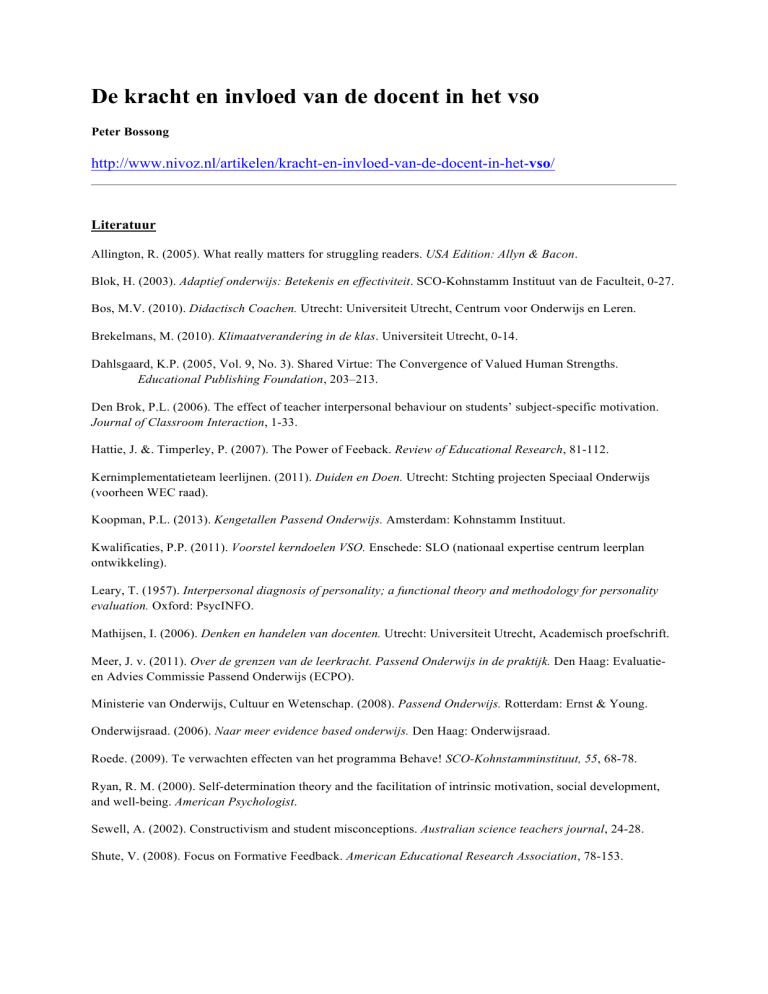
De kracht en invloed van de docent in het vso
Peter Bossong
http://www.nivoz.nl/artikelen/kracht-en-invloed-van-de-docent-in-het-vso/
Literatuur
Allington, R. (2005). What really matters for struggling readers. USA Edition: Allyn & Bacon.
Blok, H. (2003). Adaptief onderwijs: Betekenis en effectiviteit. SCO-Kohnstamm Instituut van de Faculteit, 0-27.
Bos, M.V. (2010). Didactisch Coachen. Utrecht: Universiteit Utrecht, Centrum voor Onderwijs en Leren.
Brekelmans, M. (2010). Klimaatverandering in de klas. Universiteit Utrecht, 0-14.
Dahlsgaard, K.P. (2005, Vol. 9, No. 3). Shared Virtue: The Convergence of Valued Human Strengths.
Educational Publishing Foundation, 203–213.
Den Brok, P.L. (2006). The effect of teacher interpersonal behaviour on students’ subject-specific motivation.
Journal of Classroom Interaction, 1-33.
Hattie, J. &. Timperley, P. (2007). The Power of Feeback. Review of Educational Research, 81-112.
Kernimplementatieteam leerlijnen. (2011). Duiden en Doen. Utrecht: Stchting projecten Speciaal Onderwijs
(voorheen WEC raad).
Koopman, P.L. (2013). Kengetallen Passend Onderwijs. Amsterdam: Kohnstamm Instituut.
Kwalificaties, P.P. (2011). Voorstel kerndoelen VSO. Enschede: SLO (nationaal expertise centrum leerplan
ontwikkeling).
Leary, T. (1957). Interpersonal diagnosis of personality; a functional theory and methodology for personality
evaluation. Oxford: PsycINFO.
Mathijsen, I. (2006). Denken en handelen van docenten. Utrecht: Universiteit Utrecht, Academisch proefschrift.
Meer, J. v. (2011). Over de grenzen van de leerkracht. Passend Onderwijs in de praktijk. Den Haag: Evaluatieen Advies Commissie Passend Onderwijs (ECPO).
Ministerie van Onderwijs, Cultuur en Wetenschap. (2008). Passend Onderwijs. Rotterdam: Ernst & Young.
Onderwijsraad. (2006). Naar meer evidence based onderwijs. Den Haag: Onderwijsraad.
Roede. (2009). Te verwachten effecten van het programma Behave! SCO-Kohnstamminstituut, 55, 68-78.
Ryan, R. M. (2000). Self-determination theory and the facilitation of intrinsic motivation, social development,
and well-being. American Psychologist.
Sewell, A. (2002). Constructivism and student misconceptions. Australian science teachers journal, 24-28.
Shute, V. (2008). Focus on Formative Feedback. American Educational Research Association, 78-153.
Theo Wubbels, M. B. (2006). An interpersonal perspective on Classroom Management in Secondary Classrooms
in the Netherlands. To be published in the Handbook of Classroom Management: Research, Practice, and
Contemporary Issues, Lawrence Erlbaum Associates , 0-53.
TIER. (2008). Top Institute for Evidence Based Education Research. Journal of Obstetric, Gynecologic, &
Neonatal Nursing.
Tollefson, N. (2000). Classroom applications of cognitive theories of motivation. Educational Psychology
Review, 12(1), 63-82.
Tynjälä, P. (2008). Perspectives into learning at the workplace. Educational Research Review, 3 , 130-154.
Van Petegem, A.V. (2007). The relation between school leadership from a distributed perspective and teachers
organizational commitment. Examining the source of the leadership function, 0-62.
Voerman, L.F. (2010). "Goed zo!" is onvoldoende. Van 12 tot 18, 52-55.
Vygotsky, L. (1979). The Development of Higher Forms of Attention in Childhood. Journal of Russian and East
European Psychology, 67-115.
Woolfolk-Hoy, A. (2006). Students’ and teachers’ perspectives on classroom management. Handbook for
classroom management: Research, practice, and contemporary issue, 181-220.
Wubbels, T. C. (1985). Discipline problems of beginning teachers, interactional teacher behavior mapped out.
Resources in Education, 20 , 153-164.
